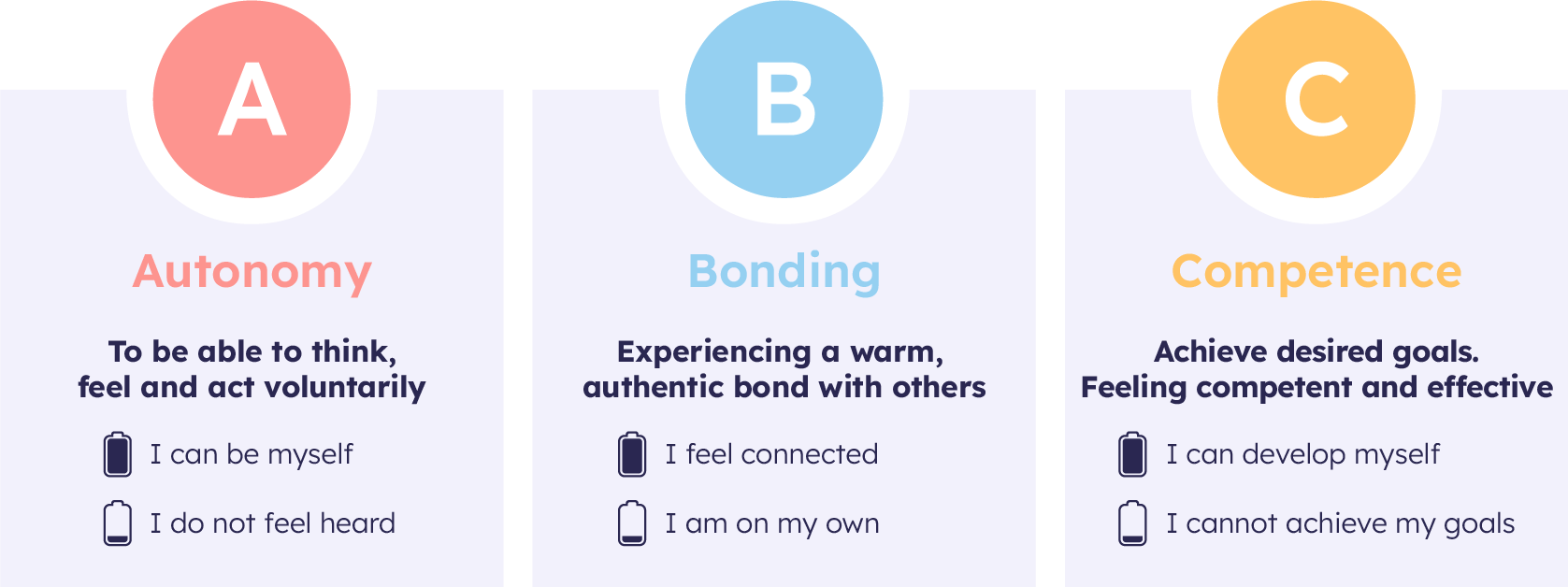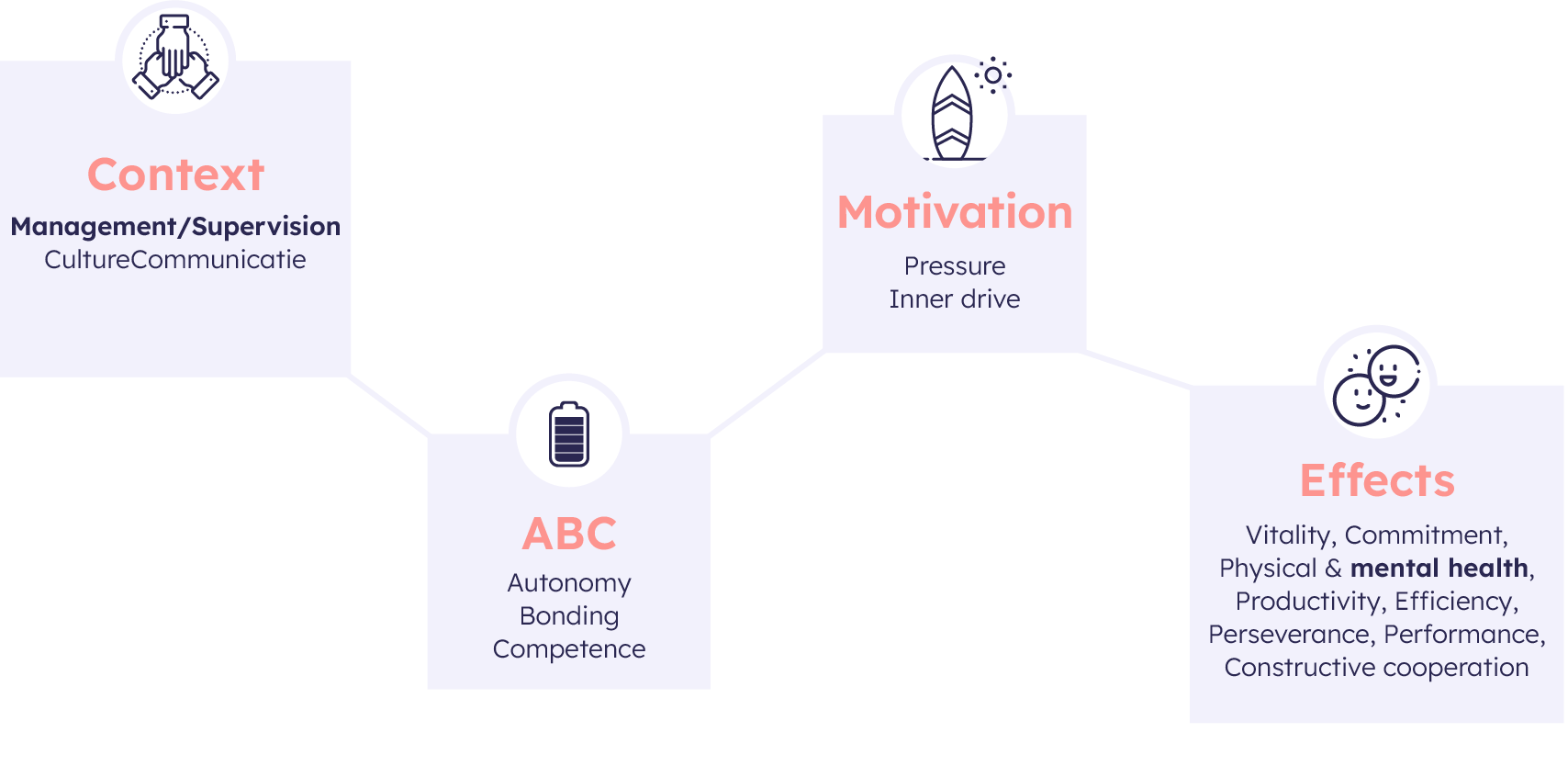Growth conversations
In growth conversations, you implement a conversational style to support students in the fulfilment of their three psychological basic needs: autonomy, bonding and competence.

Did you know this?
Eating, sleeping and drinking sufficiently are essential for your physical well-being. Your mental well-being and resilience, however, rely on the fulfilment of your three psychological basic needs: autonomy, bonding and competence. As a teacher or student counsellor, you influence the students’ ABC of psychology. The chain of motivation and the leadership compass offer guidance for conducting a structured growth conversation.
The ABC of psychology
The three basic psychological needs, autonomy, bonding/relatedness and competence, also known as the ABC of psychology, have been found to fuel your motivation, well-being and personal growth. This is true for everybody, regardless of age, gender or origin.
The three basic psychological needs make you feel comfortable in your own skin and allow you to give it your all, time and time again. The better these needs are met, the more energy you have, the more flexibly you can act and the more resilient you are in coping with difficulties. Students who feel that their needs are met tend to be more motivated in their studies and perform better. However, when these basic needs are not entirely met, you are less likely to feel good and you will be more vulnerable to emotional problems.
The chain of motivation
The chain of motivation offers a framework for analysing, in a targeted way, how the context plays a role in motivation, and how this in turn leads to certain effects.
The chain can also be used as a research tool. By filling in the chain hypothetically, you can look for the action that can lead to the desired effect.
The leadership compass
The leadership compass provides a framework on how your action can support the autonomy of students as well as offer structure to the students.
The following styles nurture students' autonomy, connectedness and competence:
- Participative: you start a dialogue with the student and offer space for participation. You also offer choices.
- Attuned: you use inviting language, you start from the student's perspective and offer space for them to express their needs and concerns. You name the added value of assignments, decisions and expectations.
- Supportive: you offer appropriate help and guidance, encouraging the student to gain insight into what is already going well and what the next step should be.
- Clarifying: you communicate clearly about the expectations and goals. You provide a consistent follow-up

The course of a growth conversation
During a counselling session, you seek to connect with the student's perspective from a fundamental attitude of curiosity.
You act as a coach and let the student take the lead in the conversation. At the same time, you proceed in a structured way, with the aim of supporting the student as much as possible in the fulfilment of their basic psychological needs.
By means of a visual framework, you offer the student a say in the (order of) themes to be discussed in your coaching sessions, and you create clarity about the objective and the structure of the conversation. In this way, the student knows what to expect in the conversation.
You also encourage self-reflection and ask what the student expects from the follow-up to what was discussed during the conversation.
What you say, matters
Your feedback gives the student the opportunity to learn and develop. What you say matters. Often you see the world through your own tinted glasses. This can quickly lead to interpreting or judging a situation through those glasses.
Be objective and only state the facts, listen to how the student views these facts and include the impact the student's behaviour has on yourself and others.
Leave room for the student to react and formulate a concrete and clear task for the future.

Being in control of your life: LifeCraft
LifeCraft is an online self-help programme that teaches you to pay more attention to your ABC needs. It allows you to discover how to spend more time on what you feel is truly important. Through your choices you can give direction to your life, recharge your ABC battery and feel more energetic
Standing stronger: students & expert share their experiences
Host Carola talks to student Mathias and Maarten Vansteenkiste, professor in developmental psychology at Ghent University. The topic of this episode is the ABC of psychology.
Keen to learn, read or hear more about this topic?
Podcasts
- Standing stronger on MoodSpace
- Maarten Vansteenkiste: ‘De behoefte aan autonomie wordt bedreigd door de lockdown’ (Dutch)
Self-help
TED Talks
- Vitamines voor groei - ontwikkeling voeden vanuit de zelfdeterminatietheorie (Dutch)
- What is the Self-Determination Theory?
- Hoe zorg ik ervoor dat ik mijn kind doet wat ik vraag? (Dutch)
Websites
- The Support Centre Inclusive Higher Education (SIHO) supports higher education institutions and policy makers in implementing a sustainable policy and practice on student mental health.
- Motiverend lesgeven gives you more information about the ABC needs and shows you how to create an environment that supports students’ needs. (Dutch)
- Together with Impetus Academy, we developed the roadmap growth conversations that can fuel students' ABCs. This roadmap can be useful for guidance conversations, including internships.
Books
- Vansteenkiste, M. & Soenens, B. (2015). Vitamines voor groei. Ontwikkeling voeden vanuit de zelf-determinatie theorie. Acco. (Dutch)
Powerful stories
You are not alone. Get inspired by other students' stories about vulnerability and doubt. But above all about the power of connectedness.
Go to the stories
